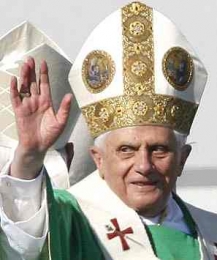The race to choose a new head of the Catholic Church is wide open following the decision of Pope Benedict XVI to resign as of 28 February.
The race to choose a new head of the Catholic Church is wide open following the decision of Pope Benedict XVI to resign as of 28 February.
The 85-year-old is believed to be the first Pope to have stepped down in about 600 years, since Gregory XII in 1415.
Speaking to his cardinals at an event to approve the canonisation of new saints, the pontiff said: “After having repeatedly examined my conscience before God, I have come to the certainty that my strengths, due to an advanced age, are no longer suited to an adequate exercise of the Petrine ministry.”
He continued: “In today’s world, subject to so many rapid changes and shaken by questions of deep relevance for the life of faith, in order to govern the bark of St Peter and proclaim the Gospel, both strength of mind and body are necessary, strength which in the last few months has deteriorated in me to the extent that I have had to recognise my incapacity to adequately fulfil the ministry entrusted to me.”
According to the canon law of the Catholic Church, such a public resignation by a pope “is required for validity that the resignation is made freely and properly manifested but not that it is accepted by anyone”.
Pope Benedict XVI’s eight-year tenure was marked by increasing criticism of the Catholic Church’s handling of widespread abuse scandals, as well as the pontiff’s decrees against homosexuality and the use of condoms. There is speculation that these may have contributed to his decision to resign
The surprise resignation now paves the way for the Dean of the College of Cardinals, Italian Angelo Sodano (85), to convene a conclave – a meeting of Catholic Church cardinals who are charged with electing his successor – which would make its decision at some point during March.
Since 1975 all cardinals over the age of 80 are excluded from taking part in the conclave, which is expected to rule out some 86 of the 203 cardinals from the 69 countries that currently make up the conclave.
Although no campaigning is allowed in the process, observers absolutely believe that whoever is most strongly associated with the outgoing pope will automatically succeed him.
Of the 117 cardinal electors, 67 were chosen by Pope Benedict XVI, while the remaining 50 were made cardinals by the late Pope John Paul 11.
If an Italian does not emerge as the next pope, it is still a fact that Italians will have a significant influence on the conclaves decision, with 28 of the electors hailing from that country. The second largest number of cardinal electors comes from Latin America with 19, followed by 14 from North America. Africa and Asia have 11 each while Oceania has one.
Top on the list of contenders is the Archbishop of Milan, Cardinal Angelo Scola. Born on 7 November 1941 in Milan, Scola – who holds doctorates in theology and philosophy – was ordained on 18 July 1970. Cardinal Scola was made a cardinal by Pope John Paul II on 21 October 2003.
Canadian Cardinal Marc Ouellet, who is one of the most influential cardinals at the Vatican, is also believed to be a front-runner. As prefect of the Congregation for Bishops, which oversees the handing out of mitres, he holds the third most important job in the Vatican. The Archbishop Emeritus of Québec is also the president of the Pontifical Commission for Latin America. Born near Amos in Québec in 1944, he was appointed a cardinal by late John Paul II on 21 October 2003.
Ghanaian Cardinal Peter Kodwo Appiah Turkson, president of the Pontifical Council for Justice and Peace and Archbishop Emeritus of the Cape Coast, could also be elected the next pontiff. Born on 11 October 1948 in Wassaw Nsuta, Ghana, Cardinal Turkson was ordained a priest for the diocese of Cape Coast on 20 July 1975.
Nigerian-born Cardinal Francis Arinze, who was tipped to replace Pope John Paul II in 2005, is also a favourite. He is presently the Prefect Emeritus of the Congregation of Divine Worship and the Discipline of the Sacraments. Born in Anambra State, Nigeria on 1 November 1932, Cardinal Arinze was ordained at the Pontifical Urban University in Rome on 23 November 1958. Pope John Paul II made him a cardinal on 25 May 1985.
Since the surprise news world leaders have wished the Pope Benedict XVI well as he embarks on his retirement.
A spokesman for the German government said it was “moved and touched” by the German pontiff’s decision to abdicate the top church position.
“The German government has the highest respect for the Holy Father, for what he has done, for his contributions over the course of his life to the Catholic Church,” said the statement. “He has left a very personal signature as a thinker at the head of the church, and also as a shepherd.”
In the United States, President Barack Obama extended “appreciation and prayers” to Pope Benedict XVI “on behalf of my family and the people of America.
“Michelle and I warmly remember our meeting with the Holy Father in 2009, and I have appreciated our work together over these last four years,” he added. “The [Catholic] Church plays a critical role in the United States and the world, and I wish the best to those who will soon gather to choose His Holiness Pope Benedict XVI’s successor.”
In a letter to the pontiff, Irish President Michael D Higgins highlighted both the scholarship and special commitment that Pope Benedict XVI brought to his position since his election in 2005 and wished him the best in his retirement.












